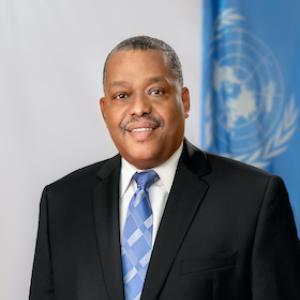I am happy that my first public engagement, though virtual, is one that recognizes an initiative that has provided a strong example of the power of partnership and our capacity to deliver more effectively when we work together.
The United Nations has been working strategically with CARICOM Member States, including agencies like CARICOM IMPACS and the Regional Security System to provide technical assistance to improve capacities of law enforcement agencies in their efforts to prevent and reduce the impact of crime and violence, while upholding respect for human rights, integrity and accountability. The UNODC-WCO-INTERPOL Airport Communication Project is one such example.
The Airport Communication Project, a UN-Government partnership, has supported authorities on border control interventions through the implementation of the UNODC Global Programmes on Border Control. The programme has resulted in the establishment of two Joint Airport Interdiction Task Forces in the International Airports of Kingston and Montego Bay Jamaica – strengthening their ability to safeguard its ports and better meet international obligations.
Similarly, UNOHCHR and its partnership with the National Police College of Jamaica (NPCJ) and Jamaica’s Constabulary Force has seen to the training of law enforcement officers as well as the development of a curriculum that appropriately reflects international human rights and training standards to better equip personnel for today’s world. A key output from this engagement was the development of a pocket guide on ‘human rights for law enforcement officials’ to be used in the training of recruits. A case manual and an online training course for the police is in the pipeline. Additionally, and in 2017, UNODC and UN OHCHR cooperated with the Jamaica Independent Commission for Investigations (INDECOM) to develop the Caribbean Model Policy on the Use of Force.
It must be noted that these interventions are guided by the joint road map for the region - The Multi Country Sustainable Development Framework (MSDF), which was signed by the governments of 18 Caribbean Countries. It outlines a “Cohesive, Safe and Just Caribbean” as one of four priorities - a priority acutely aligned to all of your national development plans. I cannot emphasize enough that this alignment and synergy is required for optimal buy-in and sustainability at the country level.
I am grateful that the Office of the UN High Commissioner for Human Rights and my predecessors saw it fit to require and facilitate the expertise of senior human rights advisors within the architecture of resident coordinator offices across the region. Doing so has allowed OHCHR to fulfil its mandate by partnering with other agencies to:
- support police services in building their internal oversight systems and external accountability measures that contribute to building integrity within police systems;
- to provide strategic advice and hands-on human rights training to police services across the world as well as key resources and Law Enforcement training materials and Guidance on Less Lethal Weapons in Law Enforcement that made available to all member states; free of cost.
Across the world, these interventions of the OHCHR, UNODC, UNPOL and our partners are also working to implement the Secretary-General’s Human Rights Due Diligence Policy. This crucial Policy was established to ensure that the United Nations maintains its ‘do no harm principle’ and does not (inadvertently) contribute to human rights violations when it supports local security forces.
Finally, we are looking forward to increasing our cooperation with the police forces in CARICOM Countries and we stand ready to support States and law enforcement agencies as they deepen their understanding of international norms and standards on the use of force and less-lethal weapons, thereby increasing their ability to respect and protect human rights and by extension, build professional, accountable and democratic police services that are respected by their people as well as the international community. These are crucial to sustaining peace and preventing the emergence of a security vacuum that is too often filled by armed criminal groups.
Helping to building credible national police services that effectively protect the population is one of the greatest legacies of the UN. This legacy continues through initiatives like this one. I wish for you a productive three days. I encourage you to glean from the rich expertise in the room. In doing so, I have no doubt that we would have put ourselves several steps closer to the vision of a more ‘Cohesive, Safe and Just Caribbean.’ Thank you.
[As prepared for delivery. Changes may exist in original presentation]





